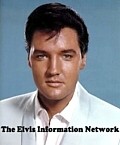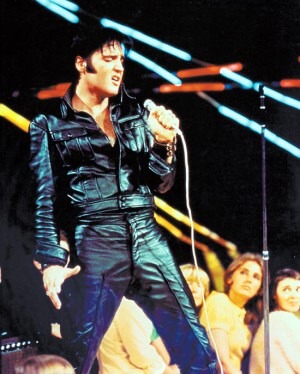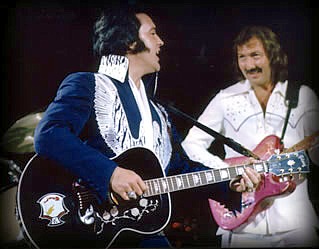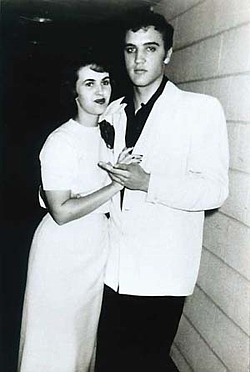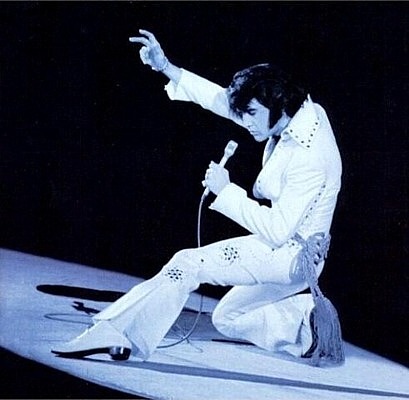EIN Website content ©
 |
 |

Elvis Presley would have turned 75 on Jan. 8, a milestone birthday that has triggered another comeback for the King of Rock 'n' Roll. In December, RCA/Legacy, the label that controls Elvis' recordings, released "Elvis 75 -- Good Rockin' Tonight," a definitive, career-spanning, four-CD box set. In February, Cirque du Soleil premiered " Viva Elvis," its newest resident show at Las Vegas' ARIA Resort & Casino. This month, Washington, D.C's, Newseum opened an exhibit that focuses on how Elvis was seen in the media, from early negative newspaper coverage that helped him become the first rock 'n' roll star, through the change in views after he served in the Army. The exhibit also includes rare objects from Elvis' life, some never before displayed outside his Memphis mansion, Graceland. Among the artifacts are his 1957 Harley-Davidson motorcycle and the overcoat and gold belt he wore to meet President Richard Nixon. "Elvis Presley: On Stage," a two-CD package drawn from Elvis' Las Vegas concerts in 1969 and 1970, came to stores this month, and a South By Southwest Music Conference panel on March 19 looked at Elvis' life and career. Today, we talk to the producer of Elvis' recordings Ernst Mikael Jorgensen and look at recollections of the King by guitarist James Burton and the queen of rockabilly, Wanda Jackson. Guitarist says King lives on Ask James Burton about Elvis Presley, and the guitarist gets straight to the point. "He was an incredible musician and singer," Burton said. "It was God's gift. Everything he did was so natural. He wasn't a great guitar player. But he was like the drummer in the band - he kept the rhythm. The guy, to me, had perfect pitch. He could start singing one of his songs out of the blue and it would be in the key he recorded it in. It was incredible."
The 1969 'In Person' disc finds Elvis doing his '50s hits and then-current singles. On the other disc, he's expanded the repertoire to include the best songs of the day, such as The Beatles' "Yesterday," Neil Diamond's "Sweet Caroline" and Tony Joe White's "Polk Salad Annie." "Elvis loved the Vegas shows," Burton said during a panel at the South By Southwest Music Conference in Austin, Texas. "He loved playing with the big orchestra. But his main love was the small rhythm section behind him. He was very close, he played very tight. He had a strong powerful voice, and we had a strong band behind him." The Vegas orchestra and Presley's touring group, known as the TCB (Taking Care of Business) Band, were well rehearsed. But Burton said there was no way to fully prepare for an Elvis show. "You had to pay attention to him," Burton said. "He was kind of like Jerry Lee Lewis. ... You just had to watch him on every song. Sometimes he'd stretch out a song. Sometimes he'd stop in the middle of a song. He might have a solo. He might not." Surprisingly, Burton said, Elvis and his band rarely had monitors, making playing even more difficult. "We played so many shows and I couldn't hear anything," Burton said. "All I could hear was screaming. I stood next to the drummer and sometimes couldn't hear the drums. I could hear my amp and that's it." Presley generated even more of a frenzy in the 1950s, drawing hundreds of screaming teens to his shows and mobs when his entourage stopped anywhere.
After seeing her versions of "Fujiyama Mama" and "Let's Have A Party" turn into hits, Jackson said, "I thought, ‘Wow, Elvis did know what he was talking about.'" On Aug. 16, 1977, Burton and the TCB band were in a plane to Portland, Maine, when the pilot got a call telling him to return to Las Vegas. "We couldn't figure out why Elvis would cancel the tour," he said. "We had to stop in Pueblo, Colo. That's where we were told that Elvis had passed. It was a very sad time. ... A lot of things went through my mind, losing such an incredible person." But Burton emphasizes Elvis continues to live on through his music: in arena-filling performances that the TCB band continues to give, with Presley shown on a big screen. And in a new Cirque du Soleil troupe in, appropriately enough, Las Vegas. Preserving legacy of Elvis For two decades, Ernst Mikael Jorgensen has been working with an artist he never met: Elvis Aaron Presley. The producer of remastered recordings, boxed sets and single-disc Presley packages, Jorgensen is an expert on all things Elvis and a man passionate about his work preserving the music and continuing the legacy of the King of Rock 'n' Roll.
Twenty-two years later, Jorgensen is still working with Elvis' music, intimately familiar with the 711 official masters in the RCA/Legacy vaults and the few additional recordings that don't belong to the company. After scouring studios and storage rooms and following rumors of lost recordings, Jorgensen said it is unlikely that any "new" Presley recordings would ever be discovered. "The hope of finding something we haven't heard is very slim by now," he said. "If we did find something, like a live recording of a '50s show, the condition of the recording itself would very likely be poor, the material having deteriorated. And it would only be of interest to 5,000 or 10,000 hard-core collectors." Asked to choose his favorite Presley record, Jorgensen hesitated, then replied: "My favorite to illustrate the point as to why Elvis, to me, was one of the greatest singers - it wasn't just that he was a great singer, it was his ability to take a song and make you believe it - is ‘Are You Lonesome Tonight?,'" Jorgensen said. "If you read the lyrics, you're not going to believe it. But with Elvis, you believe it. He's telling you, from the heart." In evaluating Presley, Jorgensen said, it's important to remember that he wasn't a songwriter. Nor was he simply stealing from the black blues and R&B singers he heard growing up in Memphis in the late '40s and early '50s. "He didn't write ‘Norwegian Wood' or ‘Purple Rain,'" Jorgensen said. "He was a singer. What he was able to do was take songs and make them his own and make people stop and listen to the song again even if it had been around before. Elvis didn't rip off Arthur Crudup. He added some feel to the song you couldn't detect in the original. It wasn't like Pat Boone doing a ‘white' version of Little Richard." During an hour-long phone conversation, Jorgensen talked about the ups and downs of Presley's career, acknowledging, for example, that his '60s movie soundtracks were often loaded with dreck, such as "No Room to Rhumba in a Sports Car." "They did three a year. Let's say there were 10 songs on each; the writers had to come up with 30 great songs a year," he said. "That didn't happen. Elvis gave in. He was made to honor his commitment. He told people he hated his movies. But he showed up. They were locked into it." In 1968, Presley had his "comeback" in an NBC-TV special highlighted by a performance with a small combo while clad in now-iconic black leather. The next year, he returned to live performances at the International Hotel in Las Vegas. Some of those shows and some from 1970 are captured on "On Stage," a two-CD set issued last week. "I think he chose the wrong place to stage his return," Jorgensen said. "It wasn't hip. But if you listen to the two Las Vegas albums, they were probably one of the peaks of Elvis' career. He hadn't played in the '60s, really, and he came back and he was like a wild animal on stage. I think he felt on top of the world from when he started in 1969 through 1971." "On Stage" is the second major Presley reissue in the past few months. In December, "Elvis 75 - Good Rockin' Tonight," a career-spanning four-CD boxed set, was released to mark what would have been Presley's 75th birthday on Jan. 8. The year's other new Presley project is "Viva Elvis," a Cirque du Soleil Las Vegas production that explores Presley's life and reworks some of his music. "It's a different slant," Jorgensen said. "The music was produced from scratch with his vocals. It's a little bit like ‘A Little Less Conversation' from 2002." Jorgensen said another Presley reissue is likely in the fall, although he didn't specify what it would be. Regardless of what comes out this fall, Jorgensen said he would continue his mission to expose Elvis' music not only to fans who found Elvis while he was alive, but to the generations who have come of age since his death in 1977. "I look at history and I see how young kids are listening to Louis Armstrong or Charlie Parker or Miles Davis," he said. "Over time, record sales will be on a sliding scale, but there will always be interest in who Elvis was. There won't be millions going out. Kids today are interested in Elvis. "We'll be making Elvis records for a long time. I think Elvis will be important and his story will be told for the rest of this century, without a doubt."
Copyright the Elvis Information Network.
|
|
